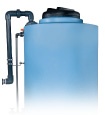Paper mills use harsh chemicals on a daily basis in the production of pulp and paper. These chemicals can be hazardous to the environment and to workers’ health, so it’s critical to install a chemical storage system you can rely on.
Topics:
Chemicals,
Chemical Storage
Whether you’re an engineer writing a spec for a chemical storage system, or an end-user who is looking for the best way to store corrosive chemicals, there are multiple factors that go into creating a safe storage system. Cost might be your first consideration, but there is more to consider than the initial price of the tank, its fittings and accessories, delivery, installation, and tank longevity.
Topics:
Chemicals,
Tank Design and Materials
Polymers are important chemicals used in the headworks of wastewater treatment plants. They facilitate the flocculation or coagulation of solids in the wastewater to produce large curds of solid materials. They also aid in dewatering of digester cake — reducing the water content to make it easier and less expensive to transport waste materials to the landfill. Polymers are highly viscous environmental stress cracking agents, which means they present unique storage challenges that require the right storage solution for adequate safety and cost effectiveness. Let’s explore these challenges and solutions.
Topics:
Chemicals
Once your food production facility outgrows your 300-gallon totes, it’s time to look into larger storage tanks for food storage and clean-in-place chemicals. There are several options on the market to choose from, but you’ll need to consider which storage tank can meet your greatest challenges: FDA requirements, full-drain capabilities, and cost-effectiveness.
Topics:
Chemicals
Commercial sodium hypochlorite is the product of chlorine and sodium hydroxide. It is typically supplied as a liquid solution with a concentration of about 12%. Although the liquid solution is more expensive than gas, it has a lower health risk, it’s easier and safer to use, and it reduces the risk of releasing chlorine gas — especially in areas that are close to surrounding properties.
Topics:
Chemicals
Clean-in-place (CIP) systems are becoming more and more popular in the food manufacturing industry. The system design makes cleaning the interior surfaces of a storage tank and the lines going out of it more effective and efficient without having to enter the tank. They also allow for a thorough cleaning with less exposure to harmful chemicals or contamination of food and beverage mixtures. Many hazardous situations are safer because of CIP systems, but they require certain considerations to be effective. Let’s look at how to make your clean-in-place system most effective.
Topics:
Chemicals
Citric acid is a chemical commonly used in a number of different beverages and drinks as a flavoring and preservative. It can also be found in some household cleaners. Safe citric acid storage isn’t necessarily a major challenge, but there are a few things you must keep in mind in order to make certain that you’re storing citric acid properly.
Topics:
Chemicals,
Chemical Storage
Sodium chloride brine is used in a variety of industrial applications. Auto manufacturers, system OEM’s, food processors, municipalities, refineries, hotels, hospitals, commercial laundries, textile dyeing houses, and chemical plants all use brine in their operations.
Topics:
Chemicals
Can you name one of the most common things companies forget to consider when purchasing a tank? Surprisingly, many operations do not consider how they will fully discharge their tanks in advance of purchasing it. It’s not until afterward that they realize the need to find a solution. However, this decision should be made in advance because it is a critical part of tank maintenance and chemical purity process.
Topics:
Chemicals
Regardless of the chemical that you are storing, nearly every chemical releases fumes. Yet, some chemicals, like hydrochloric acid, acetic acid and hydrofluoric acid, produce fumes that can’t be released into the atmosphere. These fumes are very aggressive. They can harm your chemical storage tank, your equipment, and your employees.
Topics:
Chemicals



